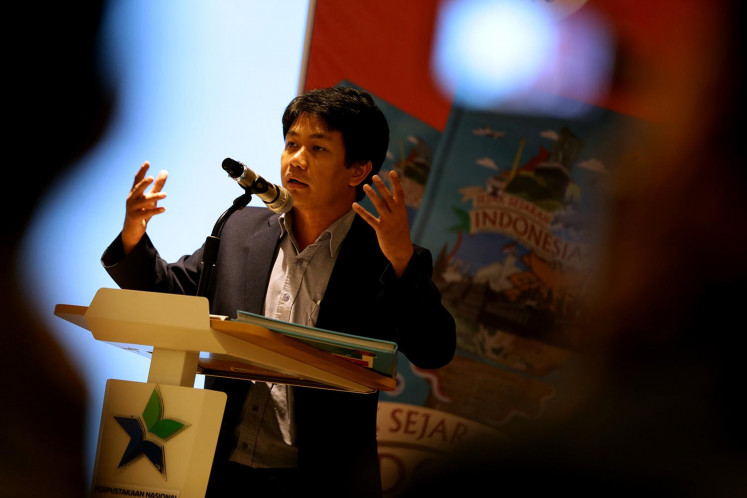New history 'chronicle' looks at Indonesia from global perspective
Published in a unique format, the book can be unfolded into a single spread that spans more than 11 meters for studying its timeline, containing highlighted historical and contemporary events in Indonesia.
Change Size
 The ITB Alumni Communication Forum (Fortuga) has published a unique book that unfolds like an ancient scroll, chronicling key events from ancient to contemporary Indonesian history. The book is presented as a timeline that is more than 11 meters long when fully extended. (JP/Wienda Parwitasari)
The ITB Alumni Communication Forum (Fortuga) has published a unique book that unfolds like an ancient scroll, chronicling key events from ancient to contemporary Indonesian history. The book is presented as a timeline that is more than 11 meters long when fully extended. (JP/Wienda Parwitasari)
E
mphasizing the importance of history classes in driving development, a group of Bandung Institute of Technology (ITB) alumni has published a unique chronicle of Indonesian history, dating back to events before the country gained independence.
The ITB Alumni Communication Forum (Fortuga) for students who enrolled at the institute in 1973 launched on Tuesday Jejak Sejarah Indonesia: Tinjauan Lini Masa Dari Perspektif FORTUGA ITB' (Tracing Indonesian history: A timeline from the ITB Fortuga perspective). The book opens with a "bang" to trace world history toward the development of modern Indonesia amid the global era.
ITB Fortuga head Kelana Budi Mulia stressed that history was as important as other subjects, like mathematics and science, in inspiring innovation and in the pursuit of development across many different sectors. Taking stock of the past would build on an established foundation that had already undergone trial and error in order to progress even further, Kelana said, citing public policies and politics as examples that posed opportunities for growth.
"History builds the nation's character," he said during Tuesday's book launch at the National Library of Indonesia in Central Jakarta.
He added that the alumni forum would collaborate with both primary and secondary schools for the book's inclusion as supplementary material for history classes.
Published in a unique format, the book can be unfolded into a single spread that spans more than 11 meters for studying its timeline, containing highlighted historical and contemporary events in Indonesia.
Read also: UI archaeology professor weighs in on Borobudur's 'chattra' restoration
ITB Fortuga book committee head Sapta Putra Yadi said the historical events curated for the chronicle were determined by an aim to highlight milestones and landmark events that put an objective spin on the nation's journey.
"The key consideration throughout the [curation] process was whether it was a significant event, whether it was something widely talked about or [events] that many were curious about but rarely explored in books," said Sapta.
HISTORIA chief editor Bonnie Triyana said in his remarks at the launch that he had learned from the book that religion studies was made compulsory in 1966, a little-known but major decision that had affected students to the present.

"Whether this decision was affected by the events in 1965 is unclear. But at least such discussions and observations can be made by looking at the timeline," Bonnie said, referring to the 1965 communist purge.
Bonnie said the "chronicle" format of the book also provided a look at Indonesia's development throughout history from a global perspective, which could serve as a source of comparative learning about civilizations and see how the country fared as events unfolded.
"The bad news is, from [the book] we know that as discoveries were being made in Europe as well as progress in the fields of science and technology, if we count the [historical] events in our case, for the most part they revolve around politics or power struggles," he told the audience.
Ancient history showed Indonesians' ability to keep up with innovation and discovery, he said, referring to Central Java' Borobudur Temple, the Buddhist temple that dates back to the 9th century. But the country then plunged into a sequence of politically driven narratives and power struggles, especially during the colonial and post-colonial eras, leading to its sluggish progress in innovation.
"But is it really the case that Indonesia is so far behind? I think that's a question that might have to be explored in the next book," said Bonnie.
He also called for more attention to scientific and technological achievements in history books, as a more comprehensive way for learning about Indonesia's past. (mut)









